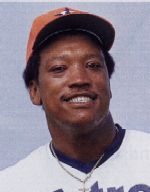 Black History Month at HurdAudio, 2006 - Summary
Black History Month at HurdAudio, 2006 - SummaryThis year's entries celebrating the music of:
Matthew Shipp: Harmony and Abyss
Sun Ra & his Arkestra: A Quiet Place in Outer Space
William Hooker: Armageddon
Don Pullen/Sam Rivers: Capricorn Rising
Leroy Jenkins/Muhal Richard Abrams: Lifelong Ambitions
Charles Mingus/Eric Dolphy/Bud Powell: Live at Antibes, July 13, 1960
Henry Threadgill: Where's Your Cup?
Dollar Brand (Abdullah Ibrahim): Duke Ellington Presents the Dollar Brand Trio
George Lewis: Monads - Triple Slow Mix - Cycle - Shadowgraph, 5 (Sextet)
Wayne Shorter: Juju
Joe Henderson: Lush Life
Anthony Davis: X, The Life and Times of Malcolm X
-----------------------------------------------------------------

Black History Month at HurdAudio is an occasion to celebrate a particular angle on my twin obsessions of music (jazz in particular) and baseball (pitching in particular). This year, the life and tragic story of J.R. Richard has been on my mind.
Jackie Robinson officially broke the "color barrier" with the Brooklyn Dodgers in 1947. Prior to that point African-American athletes were admitted into the minor leagues so that ball players could "get used" to playing alongside non-white players. This is a notion that stikes me as absurd. Segregation seems undeniably wrong in every way and any delay in phasing it out is morally questionable. If anything, minor leaguers should be "getting used" to playing competitive baseball. Now we can only speculate what it would have been like if Satchel Paige had been allowed to pitch in the major leagues in his prime because 1947 came too late for one of the best pitchers of all time.
The Houston Astros' team history goes as far back as 1962, when they were the Colt .45's. But I have deep misgivings and suspicions about the role of race and the Houston Astro's organization. And the story of J.R. Richard is a prime example. There's an excellent, and detailed account here. But essentially, he was an outstanding power pitcher for the Astros from 1971 to 1980 who hit his prime in 1976. He won 107 games for that organization over his career and had 3 consecutive seasons with 18 wins. In '76 he won 20 games. He had a fastball that was pretty close to cracking triple digits and he routinely worked over 200 innings per year.
But his career was cut short in 1980 when doctors failed to detect, treat or even take J.R. Richard's health seriously enough to prevent a blood clot from leading to a major stroke that nearly killed him and rendered him unable to pitch. His persistent health complaints and efforts to preserve his arm by taking himself out of games early were met with accusations of "laziness" even though he never missed a start and was a substantial contributer to the team's sucess. Such accusations clearly had racial overtones.
This past year the Astro's were swept out of the World Series in 4 games. In looking at the 40-man rosters of the Chicago White Sox and the Houston Astros this past October the stark difference in diversity between those two clubs is hard to miss. Is it 1947 in Houston yet? They got into the World Series on the strength of great pitching. But clearly lacked the offense to take even a single win. But I think there's an element of karma that will continue to hold the Astros just short. This is an organization that needs to undo the mistakes of their spotty history. I mean, this is the team that plays in the stadium formerly known as Enron Field. And they could start by doing right by J.R. Richard and retiring his number. They'll need to resolve the lingering questions about how they choose to staff their organization. And they should get that ridiculous flag pole out center field (not to mention that stupid slope within the field of play).


No comments:
Post a Comment